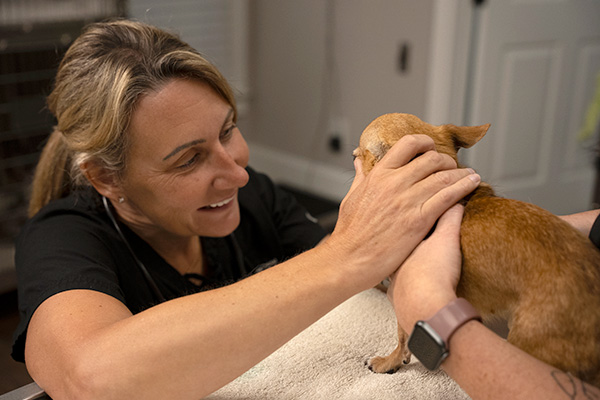Canine
Stomatitis
Canine stomatitis, also known as caudal mucositis depending on the affected area, is more than just a typical toothache. It’s a severe, painful inflammation of a dog’s mouth and gums that can affect their overall health and quality of life.
What Causes Canine Stomatitis?
The exact cause of canine stomatitis is not fully understood, but it’s believed to be an autoimmune condition where the dog’s immune system overreacts to plaque around the teeth, leading to severe inflammation. Other factors might include:
- Dental diseases, such as periodontitis and gingivitis
- Viral infections (like canine herpesvirus)
- Poor oral hygiene
- Underlying systemic conditions (e.g., diabetes, kidney disease)
Recognizing the Symptoms: When to Seek Help
The symptoms of canine stomatitis can vary but typically include:
- Severe inflammation of the gums
- Bad breath (halitosis)
- Visible plaque and tartar buildup
- Difficulty eating or complete refusal to eat
- Pawing at the mouth or face
- Drooling, which may be blood-tinged
- Weight loss and general malaise
If your dog shows any of these symptoms, it’s crucial to consult a veterinarian promptly. Early diagnosis and treatment can prevent more severe complications and ensure the safety and comfort of your pet.
Canine Stomatitis Treatment Options
Treatment for canine stomatitis involves both managing the symptoms and addressing the underlying causes:
-
Professional Cleaning
Regular dental cleanings by a veterinarian can help remove plaque and tartar, a critical step in treatment and prevention.
-
Medications
Anti-inflammatory and pain relief medications can help manage the condition. In some cases, antibiotics may be necessary to control secondary infections.
-
Dietary Changes
Soft diets can help reduce pain during eating. Special therapeutic diets might also be recommended.
-
Advanced Treatments
In severe cases, extraction of all or most teeth may be the best option to relieve pain and control the disease.
Prevention: Keeping Stomatitis at Bay
Preventive care is key in preventing canine stomatitis. Regular veterinary check-ups, maintaining good oral hygiene with daily brushing, and using dental chews approved by your vet can significantly help keep your dog’s mouth healthy and their tail wagging. Here are some steps you can take:
1. Regular Veterinary Check-ups
- Routine Exams: Schedule regular check-ups with your veterinarian to monitor the overall health of your dog’s mouth. These exams can catch early signs of gum disease before they escalate to stomatitis.
- Professional Dental Cleanings: Your vet may recommend professional cleanings, which are performed under anesthesia and allow thorough cleaning of the teeth and gums, removal of tartar and plaque, and assessment of any dental disease.
2. Daily Oral Hygiene
- Brushing Teeth: Daily brushing is the most effective way to remove plaque and prevent tartar buildup. Use a toothbrush and toothpaste specifically designed for dogs; human toothpaste can be toxic to pets.
- Dental Products: Consider using vet-recommended dental wipes, water additives, or dental sprays that help reduce plaque and freshen breath.
3. Diet and Nutrition
- Special Diets: Some pet food brands offer prescription dental diets that can help reduce plaque and tartar buildup through specially designed kibble or added ingredients that help clean the teeth.
- Chew Toys and Treats: Chew toys can help massage the gums and keep teeth cleaner by scraping away soft tartar. Look for toys that are safe for dental health and avoid those that are too hard and might cause tooth damage.
4. Environmental Management
- Stress Reduction: Stress can exacerbate health issues, including oral health. Ensure your dog has a calm environment, regular exercise, and mental stimulation.
- Avoid Noxious Agents: Keep your home free of smoke and other irritants that could contribute to oral inflammation.
FAQs About Canine Stomatitis
Q: Is canine stomatitis contagious?
A: No, canine stomatitis is not contagious between dogs as it is primarily an immune-mediated condition.
Q: Can canine stomatitis be cured?
A: While there is no outright cure, many treatments can effectively manage and alleviate the symptoms, allowing dogs to lead comfortable lives.
Q: How often should I have my dog’s teeth cleaned?
A: This can vary depending on the dog’s overall oral health, but generally, an annual professional cleaning is recommended. However, dogs with a history of dental problems might need more frequent cleanings.
A Tailored Approach
Each dog’s case of stomatitis may vary, requiring a tailored approach to treatment. It’s important to work closely with your veterinarian to determine the most effective treatment plan based on the severity of the disease and your dog’s overall health.
If you suspect your dog might be suffering from stomatitis, contact Veterinary Dental Center of Atlanta. Our team is dedicated to providing the best care for your pet’s dental health.




